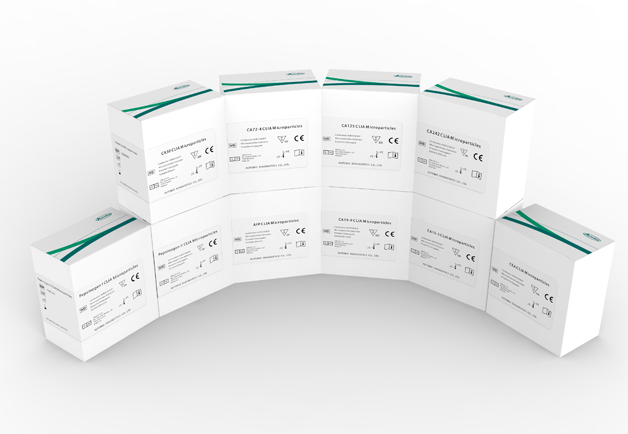

Gastric cancer was the fourth common cancer worldwide, and it was the second most common cause of death from cancer [1]. Early detection is important for improving the survival rate of patients with gastric cancer (GC).
Some serum tumor markers including alpha-fetoprotein (AFP), carcinoembryonic antigen (CEA), carbohydrate antigen (CA) 19-9, CA50, and CA72-4 have been reported to be elevated in some patients with gastric cancer [2–4].

*Autobio is devoted to enhancing the quality of our products and services. Please refer to our product manuals for detailed specifications and parameters.
Rising AFP levels may also be detected in the malignant tumors of various organs, including the stomach, lung, pancreas, colon, bladder and ovary[5–11].
In advanced or recurrent gastric cancer, the estimation of either CA 19-9 or CA-50 and CEA serum values may help in checking the prognosis, determining the efficacy of palliative treatment modalities, and recognizing recurrences[12].
CA72-4 is highly sensitive to gastric cancer, and the positive rate of serum CA72-4 in gastric cancer is reported to be 36% to 94%. And its specificity is also high, some of which even reach 100%[13]. CA72-4 can be used to detect whether there are residual tumor cells after operation and judge the prognosis of gastric cancer[14].
[1].Suenaga Y, Kanda M, Ito S, Mochizuki Y, Teramoto H, Ishigure K, Murai T, Asada T, Ishiyama A, Matsushita H, Tanaka C, Kobayashi D, Fujiwara M, Murotani K, Kodera Y. Prognostic significance of perioperative tumor marker levels in stage II/III gastric cancer. World J Gastrointest Oncol 2019; 11(1): 17-27 [PMID: 30984347 DOI: 10.4251/wjgo.v11.i1.17]
[2]Ychou M, Duffour J, Kramar A, Gourgou S, Grenier J: Clinical significance and prognostic value of CA 72-4 compared with CEA and CA19-9 in patients with gastric cancer. Dis Markers. 2000, 16: 105-110.
[3]Gao ZL, Zhang C, Du GY, Lu ZJ: Clinical significance of changes in tumor markers, extracellular matrix, MMP-9 and VEGF in patients with gastric carcinoma. Hepatogastroenterology. 2007, 54: 1591-1595.
[4]Adachi Y, Tsuchihashi J, Shiraishi N, Yasuda K, Etoh T, Kitano S: AFP-producing gastric carcinoma: multivariate analysis of prognostic factors in 270 patients. Oncology. 2003, 65: 95-101. 10.1159/000072332.
[5]Yamagata T, Yamagata Y, Nakanishi M, Matsunaga K, Minakata Y and Ichinose M: A case of primary lung cancer producing alpha-fetoprotein. Can Respir J. 11:504–506. 2004.
[6]Hamanaka W, Yoneda S, Shirakusa T, et al: Alpha-fetoprotein (AFP)-producing adrenocortical carcinoma-long survival with various therapeutic strategies including a lung resection: Report of a case. Surg Today. 38:275–278. 2008.
[7]Matsueda K, Yamamoto H, Yoshida Y and Notohara K: Hepatoid carcinoma of the pancreas producing protein induced by vitamin K absence or antagonist II (PIVKA-II) and alpha-fetoprotein (AFP). J Gastroenterol. 41:1011–1019. 2006.
[8]Kinjo T, Taniguchi H, Kushima R, Sekine S, Oda I, Saka M, Gotoda T, Kinjo F, Fujita J and Shimoda T: Histologic and immunohistochemical analyses of α-fetoprotein-producing cancer of the stomach. Am J Surg Pathol. 36:56–65. 2012.
[9]Cappetta A, Bergamo F, Mescoli C, Lonardi S, Rugge M and Zagonel V: Hepatoid adenocarcinoma of the colon: What should we target? Pathol Oncol Res. 18:93–96. 2012.
[10]Kawamura N, Hatano K, Kakuta Y, Takada T, Hara T and Yamaguchi S: A case of hepatoid adenocarcinoma of the urinary bladder. Hinyokika Kiyo. 55:619–622. 2009.(In Japanese).
[11]Isonishi S, Ogura A, Kiyokawa T, Suzuki M, Kunito S, Hirama M, Tachibana T, Ochiai K and Tanaka T: Alpha-fetoprotein (AFP)-producing ovarian tumor in an elderly woman. Int J Clin Oncol. 14:70–73. 2009.
[12]D Pectasides 1, A Mylonakis, M Kostopoulou, M Papadopoulou, D Triantafillis, J Varthalitis, M Dimitriades, A Athanassiou. CEA, CA 19-9, and CA-50 in monitoring gastric carcinoma. Am J Clin Oncol. 1997 Aug;20(4):348-53. doi: 10.1097/00000421-199708000-00005.
[13]. Cappellani A, Zanghi A, Di Vita M, et al. Clinical and biological markers in gastric cancer: update and perspectives. Front Biosci (Schol Ed) 2010;2:403–12.
[14]. Nicolini A, Ferrari P, Duffy MJ, et al. Intensive risk-adjusted follow-up with the CEA, TPA, CA19.9, and CA72.4 tumor marker panel and abdominal ultrasonography to diagnose operable colorectal cancer recurrences: effect on survival. Arch Surg (Chicago, Ill: 1960) 2010;145:1177–83.